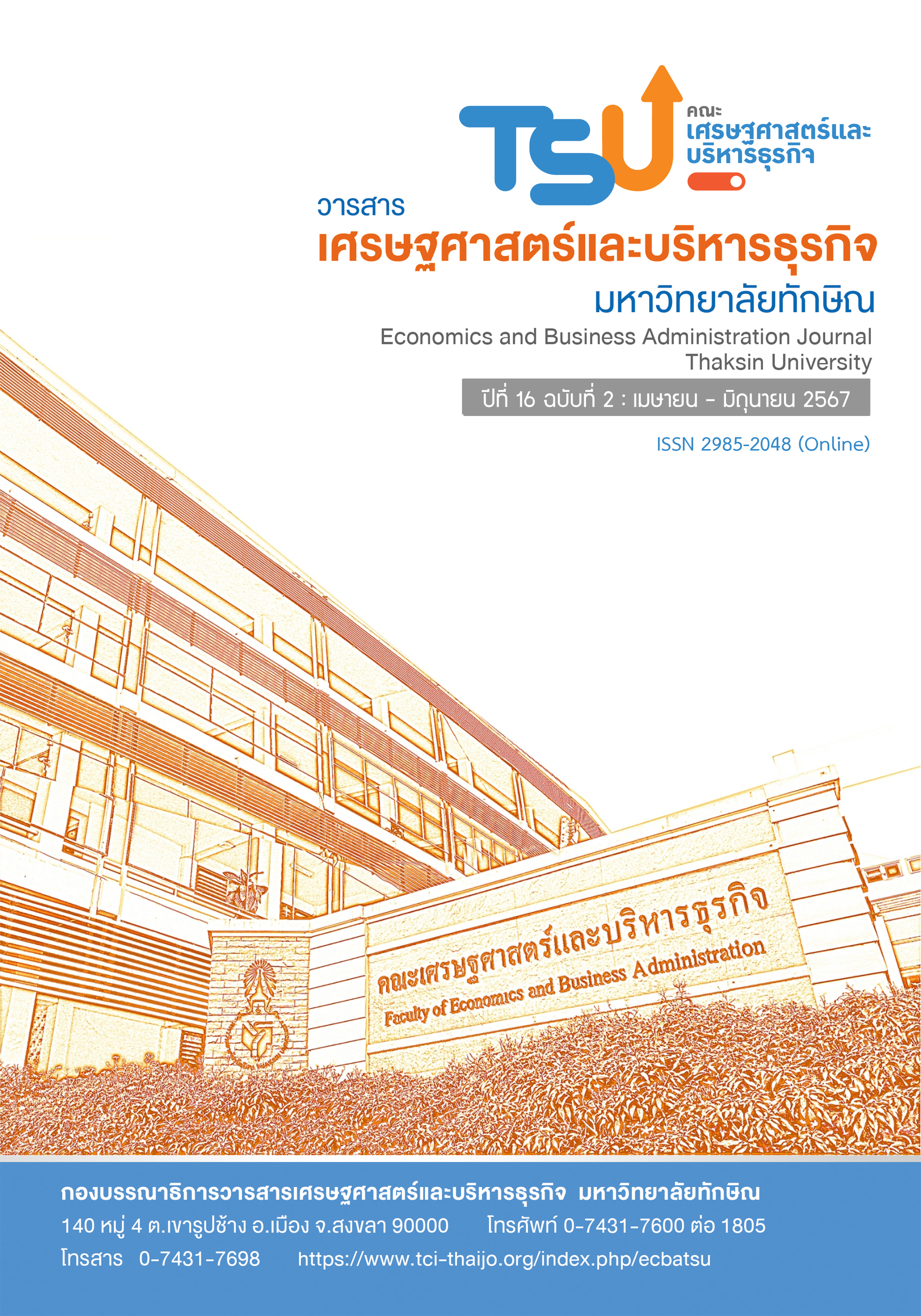Guidelines for Community-Based Innovation and Career Development of Kae Noi Royal Project Member Farmers’ Group
DOI:
https://doi.org/10.55164/ecbajournal.v16i2.263884Keywords:
Career Skills, Community-Based Innovation, Kae Noi Royal ProjectAbstract
The purpose of this study was to study and analyze how participation in Guidelines for Community-Based Innovation and Career Development of Kae Noi Royal Project Member Farmers’ Group affects career change, and self-assessment participants learn to develop career skills in terms of knowledge and skill level assessment. As well as in terms of assessing the level of indirect impact to find the guidelines for the career development scholarship program and the community-based innovation of the Northern Economic Corridor farmers’ group: Kae Noi Royal Project.Determination of sample size using a non-probability sampling method by starting with the technique of quota sampling of 60 people. The convenience sampling method and purposive sampling method were also used in this study. The participants must voluntarily provide information and participate in the project. Data collection using questionnaires and semi-structured interviews through various activities. Data were analyzed using descriptive statistics and content analysis. The results showed that the self-assessment participants learned to develop career skills in the project and had opinions at a high level in all aspects, including the aspect of living and learning with the community and the aspect of the level of indirect impact assessment of project participants.The guidelines for community-based innovation and career development scholarships that the community has accepted knowledge sets (paradigms) should focus on the aspects as follows: 1) K4 keys, which include 1.1) key persons or groups with expertise in the subject, 1.2) Indigenous cultures and cross-cultural gaps, 1.3) social and community products, and 1.4) career and entrepreneur skill courses. 2) I3, which include 2.1) in cash or the sources of funding or budget, 2.2) in kind or the sources of knowledge, and 2.3) in knowledge management. And 3) trust, which is the return of knowledge gained to the community, and information reflection and follow-up “borrowed information and return information to the community”.
References
Aphichat P., Phramaha P., Srichad A., & Phramaha Phutchu S. (2022). Strengthening Economic Foundations to Enhance the Economy, Society and to Secure Income. Journal of Arts Management, 6(2), 932-948.
Chaiyaphum A., & Krueanuan C. (2022). The Changes in Peasants Production Patterns and Adaptation in Kalasin Province: A Case Study of Nonburee Subdistrict, Sahatsakhan District, Kalasin Province. Nakhon Lampang Buddhist College’s Journal. 11(1), 56-70.
Committee on Agriculture and Cooperatives. (2021). Impacts on the Thai Economy from Coronavirus Disease (COVID-19) and Recommendations for Driving the Development of the Agricultural Sector under the National Strategic Plan According to the Situation. Secretariat of the Senate.
Department of Disease Control. (2021). Guidelines for the Prevention of Coronavirus Disease 2019 (COVID-19) for General Public and Risk Groups. Ministry of Public Health.
Equitable Education Fund. (2021). Community-Based Innovation and Career Development Scholarships Year 2021. https://www.eef.or.th/fund/community-base-2564.
Kae Noi Royal Project Cooperative. (2020). Annual Report Year 2020. Kae Noi Royal Project Cooperative.
Leerapan, B., Suphanchaima, R., Teekasap, P., Puntusavase, P., Jaichuen, W., Sornsrivichai, V., Thammawijaya, P., & Kaewkamjonchai, P. 2020. Thailand’s COVID-19 Integrated Systems Simulation Modeling (Research Report). Health Systems Research Institute.
Noknoi, C. (2022). Guidelines for Self-development of SMEs Entrepreneurs to the New Normal. Economics and Business Administration Journal, Thaksin University. 14(2), 83-106.
Office of the National Economic and Social Development Council. (2020). Report on the Results of Economic and Social Development of the Country. Office of the National Economic and Social Development Board.
Pongwiritthon K. (2018). Development of Information System for Enhancing the Competency in the Competitiveness of Small and Medium Enterprises in Northern Region of Thailand. WMS Journal of Management Walailak University. 7(2), 47-63.
Pongwiritthon R., & Kamjai K. (2018). Development of Information System for Components Assessment of Business Plan in Credit Risk Mitigation of SMEs in Thailand. University of the Thai Chamber of Commerce Journal. 38(4), 15-37.
United Nations Office of Thailand. (2021). A Decade of Action and Decade of Innovation. https://thailand.un.org/en/136290-decade-action-decade-innovatio.
Downloads
Published
How to Cite
Issue
Section
License
Copyright (c) 2024 Faculty of Economics and Business Administration, Thaksin University

This work is licensed under a Creative Commons Attribution-NonCommercial-NoDerivatives 4.0 International License.




